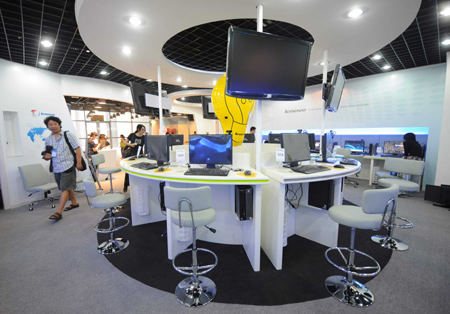To Richard Palfreyman, press chief of the 2000 Sydney Games, media advisor to the 2004 Athens Games and MPC manager of the 2006 Turin Winter Games, the Main Press Center (MPC) where accredited journalists work during the Games, is familiar territory.
Palfreyman said he believes, however, that the Beijing MPC takes the cake.
|

The Main Press Center (MPC) for Beijing Olympics officially opened July 8, 2008. [Xinhua]
|
"I think this is the best MPC I've seen. It's certainly the biggest and best planned," Palfreyman, who works closely with the International Olympic Committee, said. "It's probably the best-ever laid-out MPC, and I think Beijing has just cause to be proud of it."
The Beijing Olympic MPC officially opened Tuesday to accredited media. It will, together with the International Broadcast Center (IBC), provide 14-hour services and facilities, news and information until July 25, when it will begin 24-hour operations.
The 62,000 sq m MPC provides the biggest working space in Olympic history. It is located in the central Olympic area in the northern part of the capital, close to main Olympic venues - the Bird's Nest and Water Cube. It is only a 10-minute bus ride away from the Olympic Village.
Australian Palfreyman's glowing evaluation extends beyond the brand-new MPC's convenient location to its high Internet technologies and talented personnel.
As promised by Beijing Games organizers BOCOG, in view of rapid developments in net communication technology the MPC will be installed with unprecedentedly extensive services and high technologies.
The center's equipment includes - for the first time - a plug-and-play IC card on each desk for broadband Internet access; wireless Internet is also available.
The wireless Internet service links up with the Olympic INFO system to support copy and enable downloads to journalists' personal computers - another Olympics first.
"Those things are very important," Palfreyman said.
"They constitute the expected standard for the next Games for sure," he added.
The MPC has created many other firsts in order to offer journalists the very best working environment during the Games. They include the provision of laptop lockers on each desk, audio and video systems in eight major venues for live broadcasts and interviews in mixed zones and a clean-to-clean security check policy, whereby journalist go through the security check just once after getting on the media shuttle bus and entering venues.
"I think those working for BOCOG media relations are a very talented group of people," Palfreyman said. "They have good language skills and an understanding of what working with foreign journalists entails. That is what's needed for a successful media operation. The staff members I have met are really excellent people."
In addition to efficient working facilities, BOCOG attention to detail promises to make the MPC a home-from-home for journalists.
MPC decor incorporates Chinese cultural elements, such as calligraphy and paintings on the walls. Press conference rooms bear the names plum blossom, orchid, bamboo, chrysanthemum and pine tree, which are all essential aspects of traditional works of Chinese art.
"We hope that the quality of our professional services will make your stay in China a pleasant experience. We want to let the world know more about China," Sha Wanquan, director of the MPC and IBC venue operation team, said.
"We offer journalists covering the Games high efficiency, friendly service and a pleasant environment. We want all friends in the media to enjoy the excitement of the Beijing Games and to appreciate the efficiency of the MPC."
The MPC will be the work place for 5,600 accredited news and photographic journalists during the Games. It will continue operations during the Paralympic Games, which will open on Sept 6.